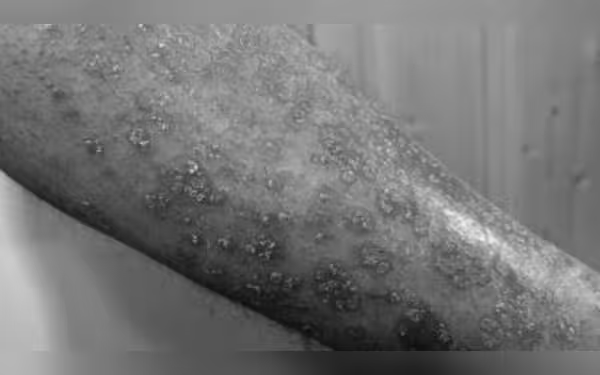Thursday, November 7, 2024 10:16 AM
Psoriasis Affects 10-20% of Pregnant Women: Expert Insights
- 10-20% of women may experience psoriasis during pregnancy.
- Hormonal changes can trigger psoriasis flare-ups.
- Consult dermatologists for effective psoriasis management.
 Image Credits: menafn
Image Credits: menafnExperts reveal that 10-20% of pregnant women may experience psoriasis due to hormonal changes, emphasizing the need for professional management.
Pregnancy is a beautiful journey filled with excitement and anticipation, but it can also bring about unexpected challenges. One such challenge that affects some women is psoriasis, a chronic autoimmune condition that can flare up during this special time. According to health experts, hormonal changes during pregnancy can trigger psoriasis in approximately 10-20 percent of women. This condition is characterized by thick, itchy, scaly patches on the skin, often appearing on areas like the knees, elbows, trunk, and scalp.
Psoriasis manifests through various symptoms, including red patches, rashes, scaling of the skin, and dryness. It occurs when the immune system becomes overactive, leading to inflammation. Dr. Jisha Pillai, a dermatologist, explains that the hormonal fluctuations during pregnancy can alter the immune response, which may result in flare-ups of psoriasis. She emphasizes that while around 10-20 percent of women may experience this condition during pregnancy, it does not pose a risk to the fetus.
Stress is another factor that can worsen existing psoriasis or even trigger new cases during pregnancy. Additionally, changes in skincare routines and increased sensitivity to environmental factors can put pregnant women at a higher risk for outbreaks. Other potential triggers include smoking, exposure to secondhand smoke, alcohol consumption, skin infections, cold weather, and certain medications.
It is important to note that many psoriasis treatments are not recommended during pregnancy due to potential risks to the developing fetus. Women may need to stop taking certain medications, which can lead to flare-ups. Dr. Parinita Kalita, an associate director in obstetrics and gynecology, highlights that women with more severe psoriasis before pregnancy may face a greater risk of exacerbation during this time.
Health experts strongly advise pregnant women to consult both a dermatologist and an obstetrician to effectively manage psoriasis. It is crucial to use only products recommended by dermatologists and to avoid self-medication. Dr. Pillai urges women to report any symptoms of psoriasis, such as red patches, scaling, and itchiness, without delay to ensure timely intervention.
While pregnancy is a time of joy, it can also bring about health challenges like psoriasis. Understanding the condition and its triggers is essential for expectant mothers. By seeking professional guidance and adhering to recommended treatments, women can navigate this journey with greater ease and comfort. Remember, taking care of your skin is just as important as taking care of your overall health during pregnancy.













